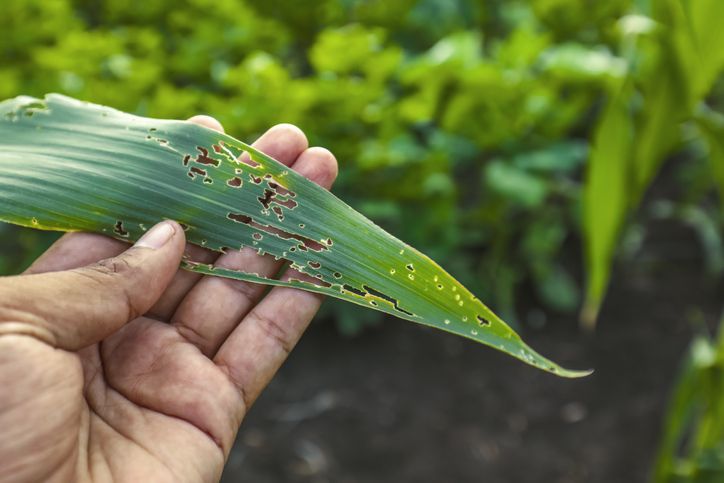The biopesticide market will reach an estimated $10 billion by 2025 and this doesn’t just include the new wave of microbial-based inputs.
“Relative to many other spaces in the biologic or input space, it’s not particularly crowded,” Brett Morris, principal at biotech-focused venture development fund TechAccel tells AFN. “There’s lots of open space and an opportunity for folks to make an impact. We have both the unique sequence, the product, and now some production capabilities that really put us in a unique position to be a major player in the space.”
Morris is talking about TechAccel’s internally incubated startup RNAissance, which has just completed the acquisition of RNAgri, a St Louis-based biotech startup developing a cost-effective way to produce RNA for use in topical RNA-interference (RNAi) products like biopesticides.
RNAi can be used to interrupt gene regulation and can be designed to be highly species-specific. This allows you to design safe organic molecules that can modulate or shut down genetic activity.
“RNA interference (RNAi) is a natural mechanism existing in cells of a wide variety of organisms including animals, plants, and fungi,” explains Morris. “In the RNA interference process, an RNAi molecule reduces the amount of a specific gene product, such as a protein. This is like closing a faucet to turn off water flow. We design RNAi molecules to turn off an essential gene in a specific target insect species, and this is pesticidal. This specificity allows us to produce very environmentally-friendly pesticides that only affect the targeted pest, leaving other insects including bees, monarch butterflies, animals, and people completely unaffected. In comparison, traditional pesticides are much more broad in what they target, and can be toxic to animals and people.”
Morris describes the acquisition as an opportunistic move. The group’s investment strategy going forward will focus on investing in production capacity and R&D as well as obtaining essential field trial data.
RNAi pesticide technology is an alternative to chemical pesticides as well as a complement to existing integrated pest management solutions. They also offer a way to combat pests that have developed resistance to chemical pesticides because they deploy a different mode of action.
“Overall, there aren’t a ton of folks who can produce RNA at a cost, yield, and purity that makes sense. We collaborated with a few different partners from a manufacturing standpoint. As we started to test RNAgri, we formed a relationship with and tested some of the material in the lab and it performed particularly well. Over time, as we started to get a better relationship with the team as well as continuing to increase yield and bring down the cost per gram, we realized there was an opportunity to acquire assets beyond just some funding or research.”
In partnership with the Donald Danforth Plant Science Center, TechAccel has been focusing on advancing novel and proprietary RNAi pesticides. It founded a biopesticide startup, RNAissance Ag, in January 2019. Its primary focus is to develop a sprayable RNA pesticide that targets pests like the Diamondback Moth, which causes $4 billion in crop losses each year.
RNAissance Ag plans to conduct a number of critical field trials this summer involving the Diamondback Moth and Fall Armyworm. Its development pipeline includes additional pest targets as well as applications as pesticidal traits in seeds. It also invested in its production infrastructure and hopes to expand its facilities and staff in St. Louis as it launches these projects.
The startup has made a firm bet in the RNAi pesticide space. It’s collaborating with other startups like GreenLight Biosciences, which is developing bioprocessed RNA products for human health and agriculture. It is engaged in a research partnership with AgroSpheres to explore formulation technology in biopesticide delivery.
RNAgri has already made a name for itself in the agrifoodtech space. It was selected as one of 33 startups to receive a $50,000 grant from Missouri Technology Corporation’s Innovation Development and Entrepreneurship Advantage program. It also received support from the St. Louis Biogenerator i6 Project as its first and largest investor. Some of its other investors include The Yield Lab, the Helix Fund, private investors, and Allen Angel Capital Education Program, which is the student-managed angel fund of the University of Missouri at Columbia.
The RNAi-based biopesticide space is not without its challenges. Some of the existing hurdles have been cost, stability, and achieving a dosage that packs enough punch to impact pests, Morris says. Because RNAi regulates gene expression and does not involve genetic modification, social license may be easier to obtain, too.
“Regulation could be a potential challenge. That’s something we are trying to plan for as much as we can. GreenLight is working on a solution for the Colorado Potato Beetle that will probably enter the regulation process and it could be the first product out there for the Colorado Potato Beetle,” Morris explains. “It would give some confidence that this can be done.”
Tropic Biosciences recently raised a large Series B round for its gene editing and RNAi combination approach to combatting pests and disease in tropical crops.





